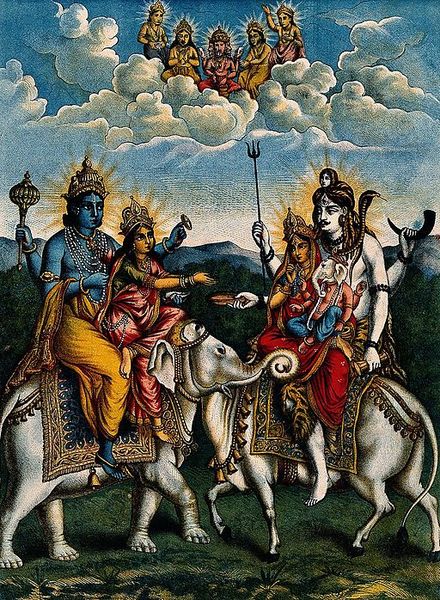Ishvara is a concept in Hinduism, with a wide range of meanings that depend on the era and the school of Hinduism. In ancient texts of Hindu philosophy, depending on the context, Ishvara can mean supreme Self, ruler, lord, king, queen or husband. In medieval era Hindu texts, depending on the school of Hinduism, Ishvara means God, Supreme Being, personal God, or special Self.
In Shaivism, Ishvara is an epithet of Shiva. In Vaishnavism it is synonymous with Vishnu, like in his epithet of Venkateswara. In traditional Bhakti movements, Ishvara is one or more deities of an individual's preference (Iṣṭa-devatā) from Hinduism's polytheistic canon of deities. In modern-day sectarian movements such as Arya Samaj and Brahmoism, Ishvara takes the form of a monotheistic God. In the Yoga school of Hinduism, it is any "personal deity" or "spiritual inspiration". In Advaita Vedanta, Ishvara is the manifested form of Brahman.

Vishnu and Shiva, the primary bearers of the epithet Ishvara, seated on mounts with consorts Lakshmi and Parvati, accompanied by Vinayaka
Ātman is a Sanskrit word for the true or eternal Self or the self-existent essence or impersonal witness-consciousness within each individual. Atman is conceptually different from Jīvātman, which persists across multiple bodies and lifetimes. Some schools of Indian philosophy regard the Ātman as distinct from the material or mortal ego (Ahamkara), the emotional aspect of the mind (Citta), and existence in an embodied form (Prakṛti). The term is often translated as soul, but is better translated as "Self", as it solely refers to pure consciousness or witness-consciousness, beyond identification with phenomena. In order to attain moksha (liberation), a human being must acquire self-knowledge.
Purusha-prakriti
Ahimsa, non-violence, is considered the highest ethical value and virtue in Hinduism. The virtue of Ahimsa follows from the Atman theories of Hindu traditions.



